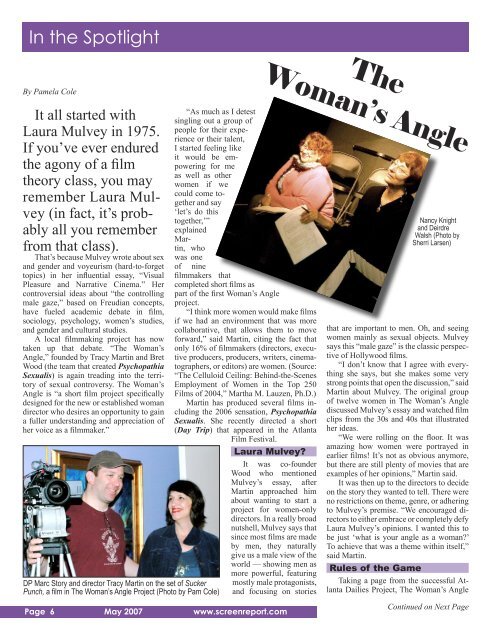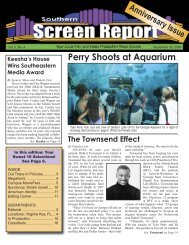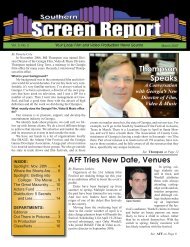The Secret: Georgia Production Partnership - Southern Screen Report
The Secret: Georgia Production Partnership - Southern Screen Report
The Secret: Georgia Production Partnership - Southern Screen Report
You also want an ePaper? Increase the reach of your titles
YUMPU automatically turns print PDFs into web optimized ePapers that Google loves.
In the Spotlight<br />
By Pamela Cole<br />
It all started with<br />
Laura Mulvey in 1975.<br />
If you’ve ever endured<br />
the agony of a film<br />
theory class, you may<br />
remember Laura Mulvey<br />
(in fact, it’s probably<br />
all you remember<br />
from that class).<br />
That’s because Mulvey wrote about sex<br />
and gender and voyeurism (hard-to-forget<br />
topics) in her influential essay, “Visual<br />
Pleasure and Narrative Cinema.” Her<br />
controversial ideas about “the controlling<br />
male gaze,” based on Freudian concepts,<br />
have fueled academic debate in film,<br />
sociology, psychology, women’s studies,<br />
and gender and cultural studies.<br />
A local filmmaking project has now<br />
taken up that debate. “<strong>The</strong> Woman’s<br />
Angle,” founded by Tracy Martin and Bret<br />
Wood (the team that created Psychopathia<br />
Sexualis) is again treading into the territory<br />
of sexual controversy. <strong>The</strong> Woman’s<br />
Angle is “a short film project specifically<br />
designed for the new or established woman<br />
director who desires an opportunity to gain<br />
a fuller understanding and appreciation of<br />
her voice as a filmmaker.”<br />
DP Marc Story and director Tracy Martin on the set of Sucker<br />
Punch, a film in <strong>The</strong> Woman’s Angle Project (Photo by Pam Cole)<br />
“As much as I detest<br />
singling out a group of<br />
people for their experience<br />
or their talent,<br />
I started feeling like<br />
it would be empowering<br />
for me<br />
as well as other<br />
women if we<br />
could come together<br />
and say<br />
‘let’s do this<br />
together,’”<br />
explained<br />
Martin,<br />
who<br />
was one<br />
of nine<br />
filmmakers that<br />
completed short films as<br />
part of the first Woman’s Angle<br />
project.<br />
“I think more women would make films<br />
if we had an environment that was more<br />
collaborative, that allows them to move<br />
forward,” said Martin, citing the fact that<br />
only 16% of filmmakers (directors, executive<br />
producers, producers, writers, cinematographers,<br />
or editors) are women. (Source:<br />
“<strong>The</strong> Celluloid Ceiling: Behind-the-Scenes<br />
Employment of Women in the Top 250<br />
Films of 2004,” Martha M. Lauzen, Ph.D.)<br />
Martin has produced several films including<br />
the 2006 sensation, Psychopathia<br />
Sexualis. She recently directed a short<br />
(Day Trip) that appeared in the Atlanta<br />
Film Festival.<br />
Laura Mulvey?<br />
It was co-founder<br />
Wood who mentioned<br />
Mulvey’s essay, after<br />
Martin approached him<br />
about wanting to start a<br />
project for women-only<br />
directors. In a really broad<br />
nutshell, Mulvey says that<br />
since most films are made<br />
by men, they naturally<br />
give us a male view of the<br />
world — showing men as<br />
more powerful, featuring<br />
mostly male protagonists,<br />
and focusing on stories<br />
Page 6 May 2007 www.screenreport.com<br />
<strong>The</strong><br />
Woman’s Angle<br />
Nancy Knight<br />
and Deirdre<br />
Walsh (Photo by<br />
Sherri Larsen)<br />
that are important to men. Oh, and seeing<br />
women mainly as sexual objects. Mulvey<br />
says this “male gaze” is the classic perspective<br />
of Hollywood films.<br />
“I don’t know that I agree with everything<br />
she says, but she makes some very<br />
strong points that open the discussion,” said<br />
Martin about Mulvey. <strong>The</strong> original group<br />
of twelve women in <strong>The</strong> Woman’s Angle<br />
discussed Mulvey’s essay and watched film<br />
clips from the 30s and 40s that illustrated<br />
her ideas.<br />
“We were rolling on the floor. It was<br />
amazing how women were portrayed in<br />
earlier films! It’s not as obvious anymore,<br />
but there are still plenty of movies that are<br />
examples of her opinions,” Martin said.<br />
It was then up to the directors to decide<br />
on the story they wanted to tell. <strong>The</strong>re were<br />
no restrictions on theme, genre, or adhering<br />
to Mulvey’s premise. “We encouraged directors<br />
to either embrace or completely defy<br />
Laura Mulvey’s opinions. I wanted this to<br />
be just ‘what is your angle as a woman?’<br />
To achieve that was a theme within itself,”<br />
said Martin.<br />
Rules of the Game<br />
Taking a page from the successful Atlanta<br />
Dailies Project, <strong>The</strong> Woman’s Angle<br />
Continued on Next Page




